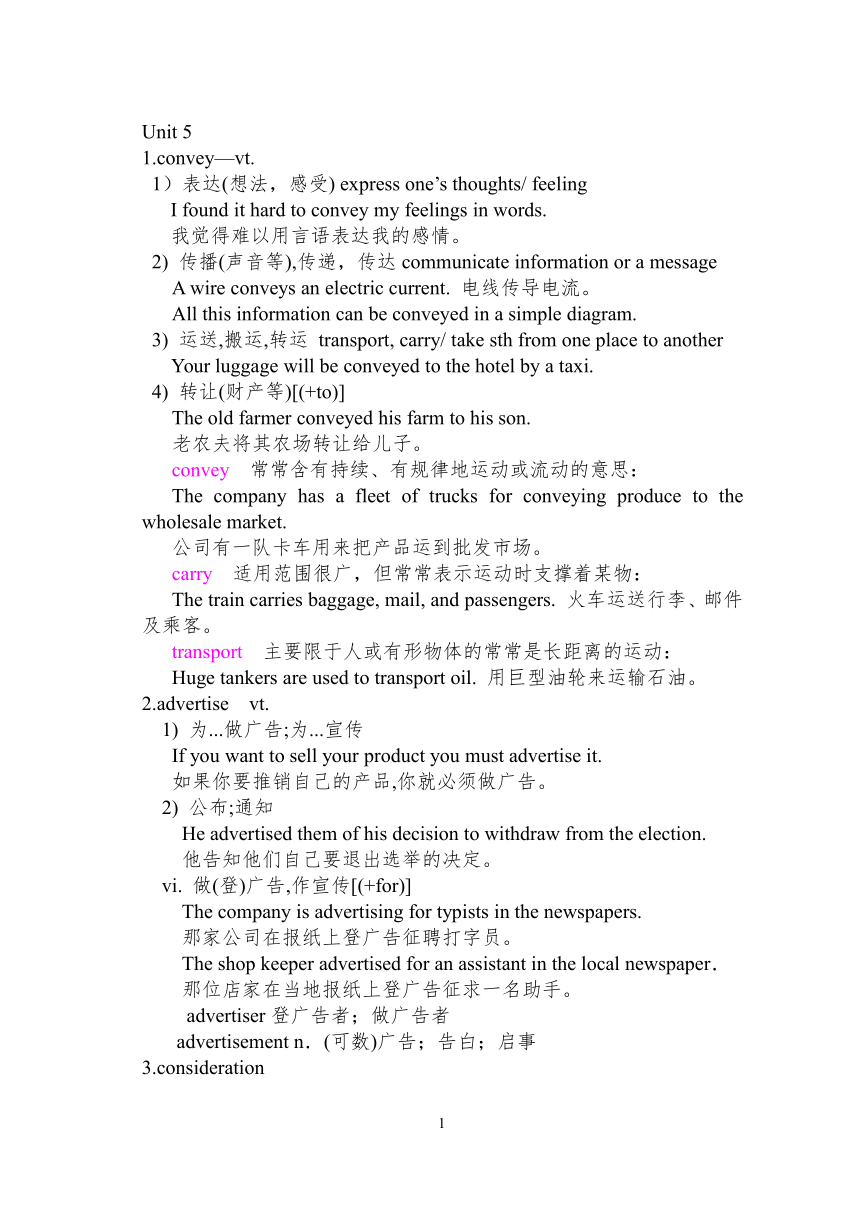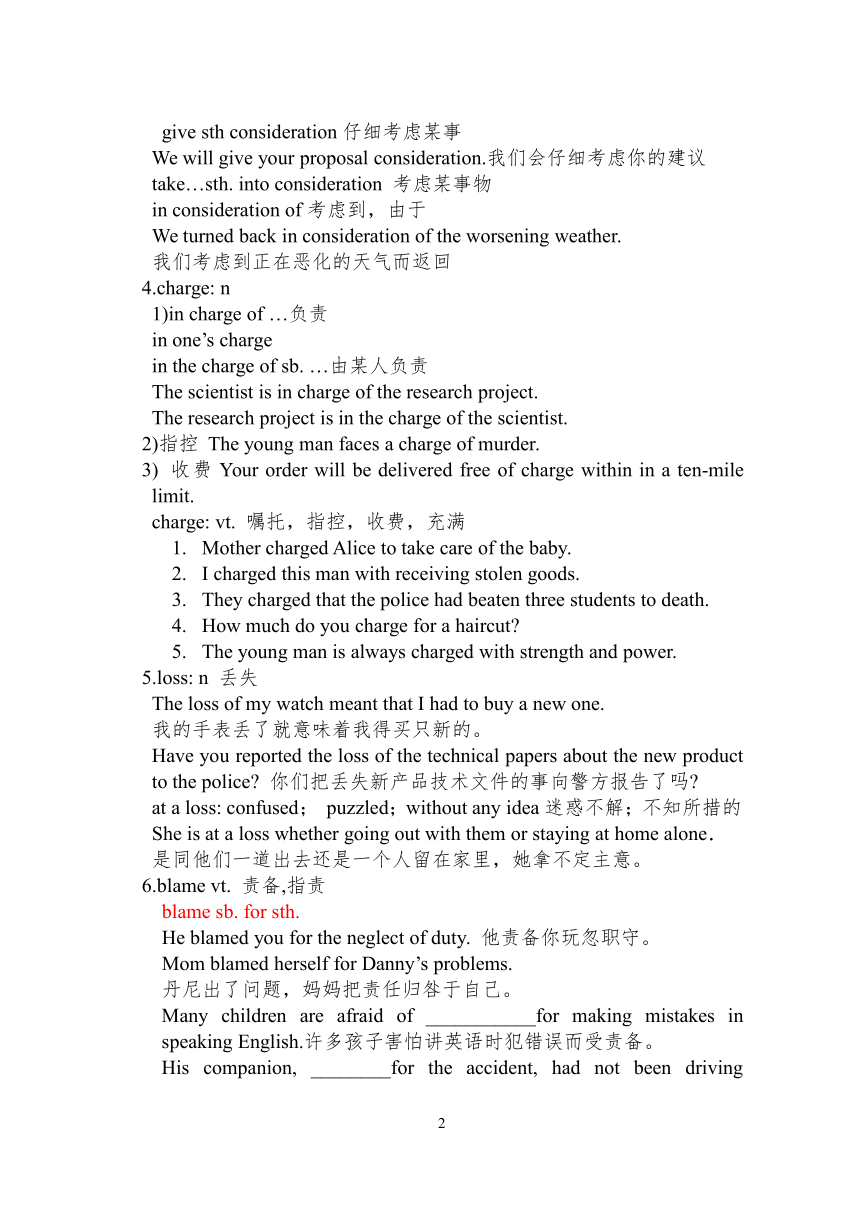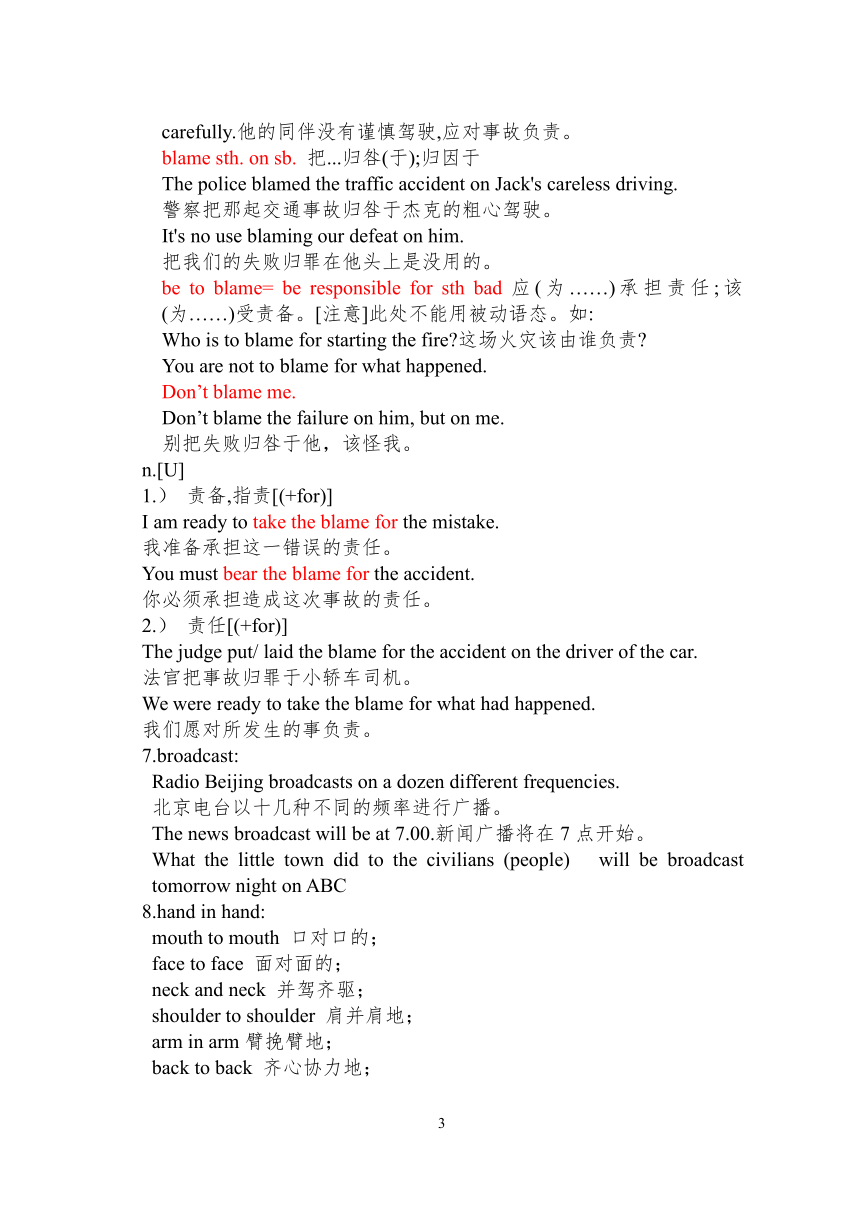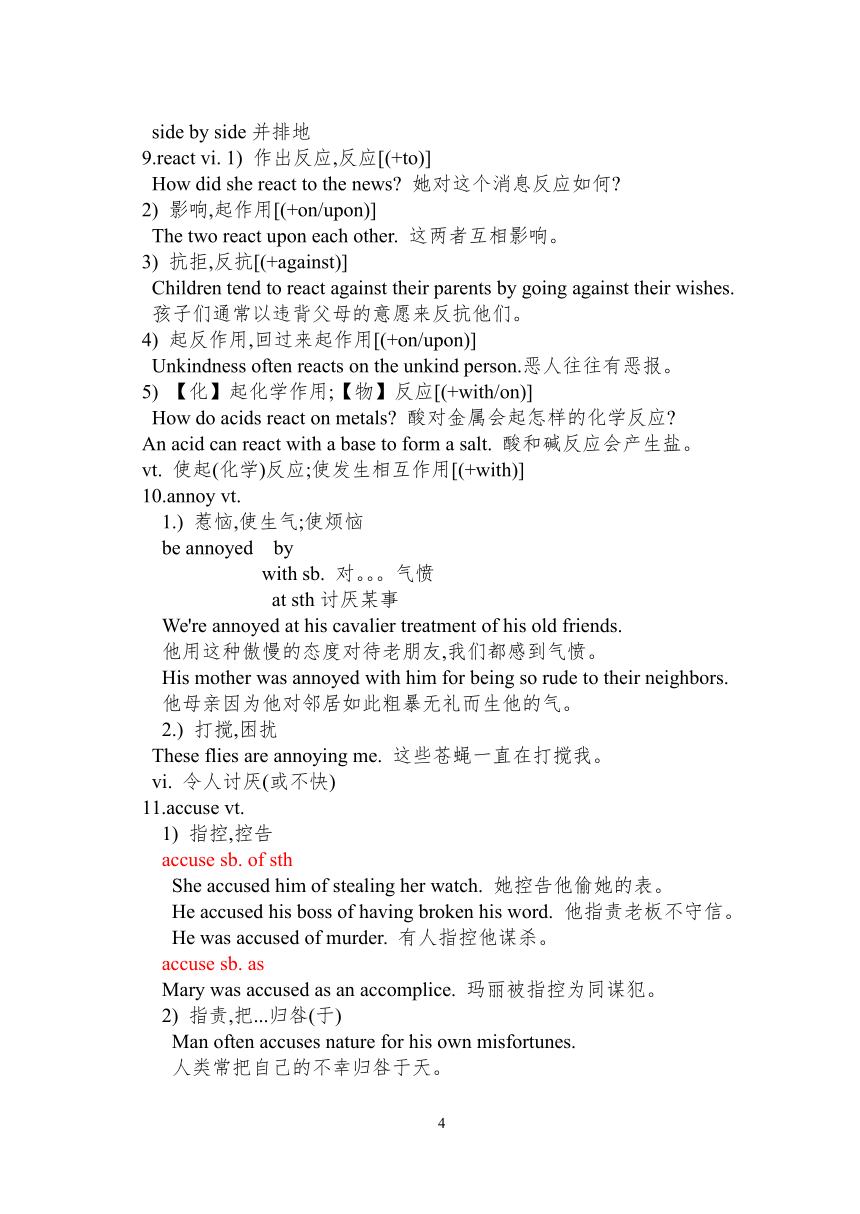高三unit5words and reading的详细讲解[上学期]
文档属性
| 名称 | 高三unit5words and reading的详细讲解[上学期] |  | |
| 格式 | rar | ||
| 文件大小 | 20.7KB | ||
| 资源类型 | 教案 | ||
| 版本资源 | |||
| 科目 | 英语 | ||
| 更新时间 | 2006-09-23 08:46:00 | ||
图片预览




文档简介
Unit 5
1.convey—vt.
1)表达(想法,感受) express one’s thoughts/ feeling
I found it hard to convey my feelings in words.
我觉得难以用言语表达我的感情。
2) 传播(声音等),传递,传达communicate information or a message
A wire conveys an electric current. 电线传导电流。
All this information can be conveyed in a simple diagram.
3) 运送,搬运,转运 transport, carry/ take sth from one place to another
Your luggage will be conveyed to the hotel by a taxi.
4) 转让(财产等)[(+to)]
The old farmer conveyed his farm to his son.
老农夫将其农场转让给儿子。
convey 常常含有持续、有规律地运动或流动的意思:
The company has a fleet of trucks for conveying produce to the wholesale market.
公司有一队卡车用来把产品运到批发市场。
carry 适用范围很广,但常常表示运动时支撑着某物:
The train carries baggage, mail, and passengers. 火车运送行李、邮件及乘客。
transport 主要限于人或有形物体的常常是长距离的运动:
Huge tankers are used to transport oil. 用巨型油轮来运输石油。
2.advertise vt.
1) 为...做广告;为...宣传
If you want to sell your product you must advertise it.
如果你要推销自己的产品,你就必须做广告。
2) 公布;通知
He advertised them of his decision to withdraw from the election.
他告知他们自己要退出选举的决定。
vi. 做(登)广告,作宣传[(+for)]
The company is advertising for typists in the newspapers.
那家公司在报纸上登广告征聘打字员。
The shop keeper advertised for an assistant in the local newspaper.
那位店家在当地报纸上登广告征求一名助手。
advertiser登广告者;做广告者
advertisement n.(可数)广告;告白;启事
3.consideration
give sth consideration仔细考虑某事
We will give your proposal consideration.我们会仔细考虑你的建议
take…sth. into consideration 考虑某事物
in consideration of考虑到,由于
We turned back in consideration of the worsening weather.
我们考虑到正在恶化的天气而返回
4.charge: n
1)in charge of …负责
in one’s charge
in the charge of sb. …由某人负责
The scientist is in charge of the research project.
The research project is in the charge of the scientist.
2)指控 The young man faces a charge of murder.
3) 收费Your order will be delivered free of charge within in a ten-mile limit.
charge: vt. 嘱托,指控,收费,充满
1. Mother charged Alice to take care of the baby.
2. I charged this man with receiving stolen goods.
3. They charged that the police had beaten three students to death.
4. How much do you charge for a haircut
5. The young man is always charged with strength and power.
5.loss: n 丢失
The loss of my watch meant that I had to buy a new one.
我的手表丢了就意味着我得买只新的。
Have you reported the loss of the technical papers about the new product to the police 你们把丢失新产品技术文件的事向警方报告了吗
at a loss: confused; puzzled;without any idea迷惑不解;不知所措的
She is at a loss whether going out with them or staying at home alone.
是同他们一道出去还是一个人留在家里,她拿不定主意。
6.blame vt. 责备,指责
blame sb. for sth.
He blamed you for the neglect of duty. 他责备你玩忽职守。
Mom blamed herself for Danny’s problems.
丹尼出了问题,妈妈把责任归咎于自己。
Many children are afraid of ___________for making mistakes in speaking English.许多孩子害怕讲英语时犯错误而受责备。
His companion, ________for the accident, had not been driving carefully.他的同伴没有谨慎驾驶,应对事故负责。
blame sth. on sb. 把...归咎(于);归因于
The police blamed the traffic accident on Jack's careless driving.
警察把那起交通事故归咎于杰克的粗心驾驶。
It's no use blaming our defeat on him.
把我们的失败归罪在他头上是没用的。
be to blame= be responsible for sth bad应(为……)承担责任;该(为……)受责备。[注意]此处不能用被动语态。如:
Who is to blame for starting the fire 这场火灾该由谁负责
You are not to blame for what happened.
Don’t blame me.
Don’t blame the failure on him, but on me.
别把失败归咎于他,该怪我。
n.[U]
1.) 责备,指责[(+for)]
I am ready to take the blame for the mistake.
我准备承担这一错误的责任。
You must bear the blame for the accident.
你必须承担造成这次事故的责任。
2.) 责任[(+for)]
The judge put/ laid the blame for the accident on the driver of the car.
法官把事故归罪于小轿车司机。
We were ready to take the blame for what had happened.
我们愿对所发生的事负责。
7.broadcast:
Radio Beijing broadcasts on a dozen different frequencies.
北京电台以十几种不同的频率进行广播。
The news broadcast will be at 7.00.新闻广播将在7点开始。
What the little town did to the civilians (people) will be broadcast tomorrow night on ABC
8.hand in hand:
mouth to mouth 口对口的;
face to face 面对面的;
neck and neck 并驾齐驱;
shoulder to shoulder 肩并肩地;
arm in arm臂挽臂地;
back to back 齐心协力地;
side by side并排地
9.react vi. 1) 作出反应,反应[(+to)]
How did she react to the news 她对这个消息反应如何
2) 影响,起作用[(+on/upon)]
The two react upon each other. 这两者互相影响。
3) 抗拒,反抗[(+against)]
Children tend to react against their parents by going against their wishes.
孩子们通常以违背父母的意愿来反抗他们。
4) 起反作用,回过来起作用[(+on/upon)]
Unkindness often reacts on the unkind person.恶人往往有恶报。
5) 【化】起化学作用;【物】反应[(+with/on)]
How do acids react on metals 酸对金属会起怎样的化学反应
An acid can react with a base to form a salt. 酸和碱反应会产生盐。
vt. 使起(化学)反应;使发生相互作用[(+with)]
10.annoy vt.
1.) 惹恼,使生气;使烦恼
be annoyed by
with sb. 对。。。气愤
at sth讨厌某事
We're annoyed at his cavalier treatment of his old friends.
他用这种傲慢的态度对待老朋友,我们都感到气愤。
His mother was annoyed with him for being so rude to their neighbors.
他母亲因为他对邻居如此粗暴无礼而生他的气。
2.) 打搅,困扰
These flies are annoying me. 这些苍蝇一直在打搅我。
vi. 令人讨厌(或不快)
11.accuse vt.
1) 指控,控告
accuse sb. of sth
She accused him of stealing her watch. 她控告他偷她的表。
He accused his boss of having broken his word. 他指责老板不守信。
He was accused of murder. 有人指控他谋杀。
accuse sb. as
Mary was accused as an accomplice. 玛丽被指控为同谋犯。
2) 指责,把...归咎(于)
Man often accuses nature for his own misfortunes.
人类常把自己的不幸归咎于天。
12.associate vt.
1.) 联想,把...联想在一起[+with]
They associate turkey with Thanksgiving.
他们把火鸡和感恩节联系在一起。
2.) 使联合,使结合[+with]
3.) 使有联系 [+with]
I didn’t want to be associated with it at all.
我根本不想与这事有牵连。
vi. 结交,交往[+with]
He associates with all sorts of people.他与各种各样的人交往。
Never associate with bad companions.千万不要与坏人为伍。
13.get across 传播,使...被理解 make oneself known
I couldn’t get my point across in the debate.
在辩论中我无法清楚地表明自己的观点。
He found it difficult to get his idea across to them.
他发现他难以使他们了解他的想法。
The teacher tried to explain the problem but the explanation did not get across to the class.
老师试图把这个问题解释清楚,但是他的解释没有被学生理解。
14.appeal vi.
1.) 呼吁,恳求[(+to/for)][+to-v]
The government is appealing to everyone to save water.
政府呼吁每个人节约用水。
The victims' families of the murder have appealed to the Supreme Court to have a definitive answer.
谋杀案的被害家属已经请求最高法院作确切的答复。
He appealed to his friends for support. 他请求朋友支持。
2. )诉诸,求助[(+to)]
We will appeal to a great variety of sources of information.
我们将求助于多种资料来源。
3) 有吸引力,迎合爱好[W][(+to)]
The idea appealed to Mary.这主意正合玛丽的心意。
4) 【律】上诉[(+to/against)]
He appealed against the five-year sentence he had been given.
他对被判五年徒刑提出上诉。
vt.【美】将...上诉,对...上诉
He appealed his case to a higher court.他向上一级法院申诉。
n.1. 呼吁,请求[C][U][(+to/for)]
He made one last appeal to his father to forgive him.
他最后一次恳求父亲宽恕他。
2) 吸引力,感染力[U]
These subjects have lost their appeal for most students.
对多数学生来说,这些学科已经失去了吸引力。
15.figure n.[C]
1) 外形;体形;人影;体态;风姿
I saw a ___ in the darkness.
A. man B. figure C.shadow D. shade
She has an attractive figure.
2) 人物;名人
He has become a figure known to everyone.
3) 数字
Where did you get those figures
4) 图表;图解;插图;画像;塑像
Our textbook has many figures to help explain the lessons.
vt.1) figure out
work out
calculate
Please help me to figure out my income tax.
2) 认为,以为;估计
I figure that you’d want your coffee.
16.profit n. 利润 [C][U] ,利益, [U]
profit – money gained by business主要指金钱,物资方面的获益
make a profit
He made a profit of fifty thousand US dollars on his house.
benefit – [ C; U] 可指物质方面所获取的利益,也可指精神方面所
得的收益,且不论是如何获得的。[ C; U]
She had the benefit of a good education.
be of benefit to sb.
be beneficial to sb.
sth. benefit sb.
sb. benefit from sth.
The book was not of much benefit to me.
We profit from the work of the specialist.
我们从专家的工作中得到益处。
advantage – [C;U] 指物质方面的利益以及在竞争中所取得的优势和占据的有利位置。[C;U]
Is there any advantage in getting there early
have the advantage (over sb.) of…
He had the advantage over other boys of being born into a rich family.
take advantage of
17.Keep an eye out for 当心,留意
keep an eye on 照看;留意
keep one’s eyes open 留心看着;保持警惕
run one‘s eyes over 扫视,浏览
turn a blind eye to 熟视无睹
catch sb.’ eye 引起(某人)注目
18.attach
1) attach oneself to依附; 参加(党派等)
He attached himself to the expedition. 他参加了那个探险队。
2) 把...归于 attach… to…
How can you attach the blame for this accident to the taxi-driver
你怎么能把这次事故的责任归于出租车司机呢
19.make sense 有意义;有道理;讲得通
This sentence doesn’t make sense. 这句子毫无意义。
It makes sense to take care of your health. 好好照顾自己是有道理的。
make sense of= understand
I can’t make sense of it.
There is no sense in doing 做谋事是没有意义的(道理的)
There is no sense in making her angry.
There is no sense in worrying about the past.
common sense常识
sensible明智的
sensitive 敏感的
20 discount
give a … discount for 给。。。打。。。折扣
We give a 10 percent discount for cash.
at a discount of 打。。。多少折扣
Reading:
1.go with 与...同行,与...相配=match
I will go with you.
Her hat goes well with her dress.
go hand in hand 手拉手地;同步地
The couple are often seen walking hand in hand in the evening.
Dirt and disease go hand in hand.灰尘总是形影相随。
High unemployment and high crime often go hand in hand.
2.--How do you ___ to her unkindly behavior
--Only silence.
Which of the following is not right
A. answer B. react C. reply D. respond
3. accuse sb. of doing sth.
charge sb. with sth.
He accused me of neglecting my duty.
The driver was charged with speeding.
4. get … across 通过;被。。。理解
The bridge was destroyed, so we couldn’t get across.
I spoke slowly, but my meaning didn’t get across.
He found it difficult to get his Chinese humor across to an English audience.
5. a large amount of
large amounts of
“大量的”“很多的”,作主语时,其谓语动词的数决定于amount 的数,即当amount是单数,谓语用单数;amount是复数,谓语动词用复数。
1) A large amount of money___ spent on the tobacco every year. is
2) Vast amounts of money ____being invested in the local market. are
a quantity of + n. 谓语的数依quantity而定
quantities of
A large quantity of food ___served. is
Large quantities of food ___served. are
6.appeal to投合(兴趣或心理)
The idea appealed to his father. 这主意正合他爸爸的心愿。
Does she say anything that appeals to you especially
7. thus 因此;于是(引导前面话语的结果或结论
He didn’t study hard, and thus failed the test.
I didn’t watch yesterday’s news, and thus I knew nothing about the new policy.
thus doing 因此;从而;于是(作结果状语)
Water can absorb and give off a lot off heat without big changes in temperature, thus creating a stable environment.
8. arm…with… / be armed with 武装;装备;具有; 拥有
The policemen were armed with pistols.
The lecturer was armed with facts and figures.
Parents should arm their children with good education.
9. Not all ads are used to promote …
= All the ads are not used to promote …
not 用于含有all, both, every, always 等的句中,构成部分否定。
Not all ads are used to promote a product or to increase a company’s profits= All ads are not used…
*-Was the exam very easy
-Yes, but I think not ____ could pass it.
A. anyone B. everyone C. someone D. no one
Not both of them are my friends.
Both of them are not my friends.
10. be aware of
11.keep an eye out for
12. distinguish between
PAGE
9
1.convey—vt.
1)表达(想法,感受) express one’s thoughts/ feeling
I found it hard to convey my feelings in words.
我觉得难以用言语表达我的感情。
2) 传播(声音等),传递,传达communicate information or a message
A wire conveys an electric current. 电线传导电流。
All this information can be conveyed in a simple diagram.
3) 运送,搬运,转运 transport, carry/ take sth from one place to another
Your luggage will be conveyed to the hotel by a taxi.
4) 转让(财产等)[(+to)]
The old farmer conveyed his farm to his son.
老农夫将其农场转让给儿子。
convey 常常含有持续、有规律地运动或流动的意思:
The company has a fleet of trucks for conveying produce to the wholesale market.
公司有一队卡车用来把产品运到批发市场。
carry 适用范围很广,但常常表示运动时支撑着某物:
The train carries baggage, mail, and passengers. 火车运送行李、邮件及乘客。
transport 主要限于人或有形物体的常常是长距离的运动:
Huge tankers are used to transport oil. 用巨型油轮来运输石油。
2.advertise vt.
1) 为...做广告;为...宣传
If you want to sell your product you must advertise it.
如果你要推销自己的产品,你就必须做广告。
2) 公布;通知
He advertised them of his decision to withdraw from the election.
他告知他们自己要退出选举的决定。
vi. 做(登)广告,作宣传[(+for)]
The company is advertising for typists in the newspapers.
那家公司在报纸上登广告征聘打字员。
The shop keeper advertised for an assistant in the local newspaper.
那位店家在当地报纸上登广告征求一名助手。
advertiser登广告者;做广告者
advertisement n.(可数)广告;告白;启事
3.consideration
give sth consideration仔细考虑某事
We will give your proposal consideration.我们会仔细考虑你的建议
take…sth. into consideration 考虑某事物
in consideration of考虑到,由于
We turned back in consideration of the worsening weather.
我们考虑到正在恶化的天气而返回
4.charge: n
1)in charge of …负责
in one’s charge
in the charge of sb. …由某人负责
The scientist is in charge of the research project.
The research project is in the charge of the scientist.
2)指控 The young man faces a charge of murder.
3) 收费Your order will be delivered free of charge within in a ten-mile limit.
charge: vt. 嘱托,指控,收费,充满
1. Mother charged Alice to take care of the baby.
2. I charged this man with receiving stolen goods.
3. They charged that the police had beaten three students to death.
4. How much do you charge for a haircut
5. The young man is always charged with strength and power.
5.loss: n 丢失
The loss of my watch meant that I had to buy a new one.
我的手表丢了就意味着我得买只新的。
Have you reported the loss of the technical papers about the new product to the police 你们把丢失新产品技术文件的事向警方报告了吗
at a loss: confused; puzzled;without any idea迷惑不解;不知所措的
She is at a loss whether going out with them or staying at home alone.
是同他们一道出去还是一个人留在家里,她拿不定主意。
6.blame vt. 责备,指责
blame sb. for sth.
He blamed you for the neglect of duty. 他责备你玩忽职守。
Mom blamed herself for Danny’s problems.
丹尼出了问题,妈妈把责任归咎于自己。
Many children are afraid of ___________for making mistakes in speaking English.许多孩子害怕讲英语时犯错误而受责备。
His companion, ________for the accident, had not been driving carefully.他的同伴没有谨慎驾驶,应对事故负责。
blame sth. on sb. 把...归咎(于);归因于
The police blamed the traffic accident on Jack's careless driving.
警察把那起交通事故归咎于杰克的粗心驾驶。
It's no use blaming our defeat on him.
把我们的失败归罪在他头上是没用的。
be to blame= be responsible for sth bad应(为……)承担责任;该(为……)受责备。[注意]此处不能用被动语态。如:
Who is to blame for starting the fire 这场火灾该由谁负责
You are not to blame for what happened.
Don’t blame me.
Don’t blame the failure on him, but on me.
别把失败归咎于他,该怪我。
n.[U]
1.) 责备,指责[(+for)]
I am ready to take the blame for the mistake.
我准备承担这一错误的责任。
You must bear the blame for the accident.
你必须承担造成这次事故的责任。
2.) 责任[(+for)]
The judge put/ laid the blame for the accident on the driver of the car.
法官把事故归罪于小轿车司机。
We were ready to take the blame for what had happened.
我们愿对所发生的事负责。
7.broadcast:
Radio Beijing broadcasts on a dozen different frequencies.
北京电台以十几种不同的频率进行广播。
The news broadcast will be at 7.00.新闻广播将在7点开始。
What the little town did to the civilians (people) will be broadcast tomorrow night on ABC
8.hand in hand:
mouth to mouth 口对口的;
face to face 面对面的;
neck and neck 并驾齐驱;
shoulder to shoulder 肩并肩地;
arm in arm臂挽臂地;
back to back 齐心协力地;
side by side并排地
9.react vi. 1) 作出反应,反应[(+to)]
How did she react to the news 她对这个消息反应如何
2) 影响,起作用[(+on/upon)]
The two react upon each other. 这两者互相影响。
3) 抗拒,反抗[(+against)]
Children tend to react against their parents by going against their wishes.
孩子们通常以违背父母的意愿来反抗他们。
4) 起反作用,回过来起作用[(+on/upon)]
Unkindness often reacts on the unkind person.恶人往往有恶报。
5) 【化】起化学作用;【物】反应[(+with/on)]
How do acids react on metals 酸对金属会起怎样的化学反应
An acid can react with a base to form a salt. 酸和碱反应会产生盐。
vt. 使起(化学)反应;使发生相互作用[(+with)]
10.annoy vt.
1.) 惹恼,使生气;使烦恼
be annoyed by
with sb. 对。。。气愤
at sth讨厌某事
We're annoyed at his cavalier treatment of his old friends.
他用这种傲慢的态度对待老朋友,我们都感到气愤。
His mother was annoyed with him for being so rude to their neighbors.
他母亲因为他对邻居如此粗暴无礼而生他的气。
2.) 打搅,困扰
These flies are annoying me. 这些苍蝇一直在打搅我。
vi. 令人讨厌(或不快)
11.accuse vt.
1) 指控,控告
accuse sb. of sth
She accused him of stealing her watch. 她控告他偷她的表。
He accused his boss of having broken his word. 他指责老板不守信。
He was accused of murder. 有人指控他谋杀。
accuse sb. as
Mary was accused as an accomplice. 玛丽被指控为同谋犯。
2) 指责,把...归咎(于)
Man often accuses nature for his own misfortunes.
人类常把自己的不幸归咎于天。
12.associate vt.
1.) 联想,把...联想在一起[+with]
They associate turkey with Thanksgiving.
他们把火鸡和感恩节联系在一起。
2.) 使联合,使结合[+with]
3.) 使有联系 [+with]
I didn’t want to be associated with it at all.
我根本不想与这事有牵连。
vi. 结交,交往[+with]
He associates with all sorts of people.他与各种各样的人交往。
Never associate with bad companions.千万不要与坏人为伍。
13.get across 传播,使...被理解 make oneself known
I couldn’t get my point across in the debate.
在辩论中我无法清楚地表明自己的观点。
He found it difficult to get his idea across to them.
他发现他难以使他们了解他的想法。
The teacher tried to explain the problem but the explanation did not get across to the class.
老师试图把这个问题解释清楚,但是他的解释没有被学生理解。
14.appeal vi.
1.) 呼吁,恳求[(+to/for)][+to-v]
The government is appealing to everyone to save water.
政府呼吁每个人节约用水。
The victims' families of the murder have appealed to the Supreme Court to have a definitive answer.
谋杀案的被害家属已经请求最高法院作确切的答复。
He appealed to his friends for support. 他请求朋友支持。
2. )诉诸,求助[(+to)]
We will appeal to a great variety of sources of information.
我们将求助于多种资料来源。
3) 有吸引力,迎合爱好[W][(+to)]
The idea appealed to Mary.这主意正合玛丽的心意。
4) 【律】上诉[(+to/against)]
He appealed against the five-year sentence he had been given.
他对被判五年徒刑提出上诉。
vt.【美】将...上诉,对...上诉
He appealed his case to a higher court.他向上一级法院申诉。
n.1. 呼吁,请求[C][U][(+to/for)]
He made one last appeal to his father to forgive him.
他最后一次恳求父亲宽恕他。
2) 吸引力,感染力[U]
These subjects have lost their appeal for most students.
对多数学生来说,这些学科已经失去了吸引力。
15.figure n.[C]
1) 外形;体形;人影;体态;风姿
I saw a ___ in the darkness.
A. man B. figure C.shadow D. shade
She has an attractive figure.
2) 人物;名人
He has become a figure known to everyone.
3) 数字
Where did you get those figures
4) 图表;图解;插图;画像;塑像
Our textbook has many figures to help explain the lessons.
vt.1) figure out
work out
calculate
Please help me to figure out my income tax.
2) 认为,以为;估计
I figure that you’d want your coffee.
16.profit n. 利润 [C][U] ,利益, [U]
profit – money gained by business主要指金钱,物资方面的获益
make a profit
He made a profit of fifty thousand US dollars on his house.
benefit – [ C; U] 可指物质方面所获取的利益,也可指精神方面所
得的收益,且不论是如何获得的。[ C; U]
She had the benefit of a good education.
be of benefit to sb.
be beneficial to sb.
sth. benefit sb.
sb. benefit from sth.
The book was not of much benefit to me.
We profit from the work of the specialist.
我们从专家的工作中得到益处。
advantage – [C;U] 指物质方面的利益以及在竞争中所取得的优势和占据的有利位置。[C;U]
Is there any advantage in getting there early
have the advantage (over sb.) of…
He had the advantage over other boys of being born into a rich family.
take advantage of
17.Keep an eye out for 当心,留意
keep an eye on 照看;留意
keep one’s eyes open 留心看着;保持警惕
run one‘s eyes over 扫视,浏览
turn a blind eye to 熟视无睹
catch sb.’ eye 引起(某人)注目
18.attach
1) attach oneself to依附; 参加(党派等)
He attached himself to the expedition. 他参加了那个探险队。
2) 把...归于 attach… to…
How can you attach the blame for this accident to the taxi-driver
你怎么能把这次事故的责任归于出租车司机呢
19.make sense 有意义;有道理;讲得通
This sentence doesn’t make sense. 这句子毫无意义。
It makes sense to take care of your health. 好好照顾自己是有道理的。
make sense of= understand
I can’t make sense of it.
There is no sense in doing 做谋事是没有意义的(道理的)
There is no sense in making her angry.
There is no sense in worrying about the past.
common sense常识
sensible明智的
sensitive 敏感的
20 discount
give a … discount for 给。。。打。。。折扣
We give a 10 percent discount for cash.
at a discount of 打。。。多少折扣
Reading:
1.go with 与...同行,与...相配=match
I will go with you.
Her hat goes well with her dress.
go hand in hand 手拉手地;同步地
The couple are often seen walking hand in hand in the evening.
Dirt and disease go hand in hand.灰尘总是形影相随。
High unemployment and high crime often go hand in hand.
2.--How do you ___ to her unkindly behavior
--Only silence.
Which of the following is not right
A. answer B. react C. reply D. respond
3. accuse sb. of doing sth.
charge sb. with sth.
He accused me of neglecting my duty.
The driver was charged with speeding.
4. get … across 通过;被。。。理解
The bridge was destroyed, so we couldn’t get across.
I spoke slowly, but my meaning didn’t get across.
He found it difficult to get his Chinese humor across to an English audience.
5. a large amount of
large amounts of
“大量的”“很多的”,作主语时,其谓语动词的数决定于amount 的数,即当amount是单数,谓语用单数;amount是复数,谓语动词用复数。
1) A large amount of money___ spent on the tobacco every year. is
2) Vast amounts of money ____being invested in the local market. are
a quantity of + n. 谓语的数依quantity而定
quantities of
A large quantity of food ___served. is
Large quantities of food ___served. are
6.appeal to投合(兴趣或心理)
The idea appealed to his father. 这主意正合他爸爸的心愿。
Does she say anything that appeals to you especially
7. thus 因此;于是(引导前面话语的结果或结论
He didn’t study hard, and thus failed the test.
I didn’t watch yesterday’s news, and thus I knew nothing about the new policy.
thus doing 因此;从而;于是(作结果状语)
Water can absorb and give off a lot off heat without big changes in temperature, thus creating a stable environment.
8. arm…with… / be armed with 武装;装备;具有; 拥有
The policemen were armed with pistols.
The lecturer was armed with facts and figures.
Parents should arm their children with good education.
9. Not all ads are used to promote …
= All the ads are not used to promote …
not 用于含有all, both, every, always 等的句中,构成部分否定。
Not all ads are used to promote a product or to increase a company’s profits= All ads are not used…
*-Was the exam very easy
-Yes, but I think not ____ could pass it.
A. anyone B. everyone C. someone D. no one
Not both of them are my friends.
Both of them are not my friends.
10. be aware of
11.keep an eye out for
12. distinguish between
PAGE
9
